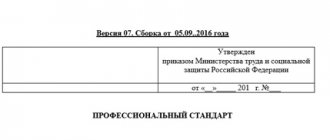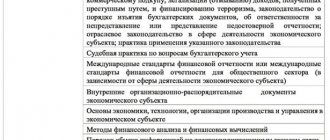Profstandard warehouse manager
Professional standard for warehouse manager Job responsibilities. Manages the work of the warehouse for the reception, storage and release of inventory items, their placement, taking into account the most rational use of warehouse space, facilitating and speeding up the search for necessary materials, inventory, etc. Table of contents:
- Where can professional standards for storekeepers be applied?
- Administrative and economic activities specialist
- Professional standard for warehouse manager
- Labor functions of a storekeeper
- Job description
- Position "storekeeper": labor functions
- 4. Rights
- Dismissal due to non-compliance with standard
- Employee eligibility requirements and conditions
- Why does a storekeeper need professional standards?
- Information about the educational organization
- 6. Final provisions
- 1. General Provisions
- Job responsibilities and list
- 5. Responsibility
- Requirements for a specialist
- Sample job description for warehouse manager 2020
- Can a storekeeper who does not meet professional standards be fired?
- Warehouse Manager
- Advanced training and certification
- Send a request
- Professional standards relevant for the position of “storekeeper”
- Profstandard storekeeper
- What is the professional standard of a storekeeper?
- Regulatory framework regarding the introduction of professional standards
- Is a professional standard a reason for dismissal?
- Sample job description for warehouse manager
- Job description
- What professional standards does a storekeeper follow?
- Responsibilities
- Storekeeper's professional standard
- What is the professional standard for a storekeeper?
- 2. Labor functions
- Structure of professional standards
- Advantages of using professional standards for storekeepers
- Liability for non-use
- 3. Job responsibilities
- Professional requirements for a storekeeper and farm manager
- Scope of application and mandatory use
Ensures the safety of stored inventory, compliance with storage regimes, rules for registration and delivery of receipts and expenditure documents. Monitors the availability and serviceability of fire-fighting equipment, the condition of premises, equipment and inventory in the warehouse and ensures their timely repair.
Organizes loading and unloading operations at the warehouse in compliance with norms, rules and instructions on labor protection.
Takes part in the development and implementation of measures to improve the efficiency of warehouse operations, reduce the costs of transportation and storage of inventory, and introduce modern technologies into the warehouse organization.
What professional standards does a storekeeper follow?
Since July 2020, Russia has introduced mandatory professional standards for many positions - documents in which government bodies (in this case, the Ministry of Labor of the Russian Federation) indicate what level of qualifications an employee must have in a specific position and what specific job functions he must perform. Moreover, by the time professional standards turned from recommendations into mandatory standards, several hundred standards had already been adopted.
Among the positions to which professional standards are now applied is the position of storekeeper. However, it is necessary to take into account the specific field in which this employee works.
Storekeeper's professional standard
Home - Business Organization - Personnel - The responsibilities of workers who ensure the full functioning of premises intended for storing goods and any material assets are described in the professional standard of a storekeeper.
Ensures the collection, storage and timely return of loading items to suppliers. Participates in conducting inventories of inventory items. Controls the maintenance of records of warehouse operations and established reporting.
It contains a list of professional requirements and labor characteristics that an applicant for the position of storekeeper must meet. Contents: 1. Professional standards relevant for the position “storekeeper” 2. Position “storekeeper”: labor functions 3. Advantages of using professional standards for storekeepers 4.
Is an occupational standard a reason for dismissal? Occupational standards relevant for the position of “storekeeper” In 2014, the Ministry of Labor of the Russian Federation introduced mandatory provisions with a clear description of the gradation of skill levels for workers in the following positions:
- "Automotive logistics specialist"
- “Specialist in the field of supplying the construction industry with materials.”
All points of this provision are reflected in ministerial orders No. 721 and No. 972 (respectively). Both standards are relevant for the logistics and construction industries.
The logistics industry needs specific equipment and tools, which must be stored under strictly defined conditions. Since cargo transportation is a complex, multi-stage process, it requires careful technical preparation using special equipment and specialized equipment.
Strict regulation of warehouse operation contributes to the preservation of material assets in impeccable condition. As for the construction industry, the further comfortable operation of the complex being built (housing or social) depends on the degree of preservation of materials intended for work on site.
Structurally, the professional standard consists of the following parts:
- Description of job functions: the intended title of the position and the category to which it must correspond.
- Imprint about the developers.
- General provisions: official job title; encoding; the purpose of creating this position.
- Functional card: required qualification category according to generally accepted numbering; list of labor functions.
The job functions assigned to the positions listed above are similar.
The severity of the requirements of the Ministry of Labor for the development of a professional standard for storekeepers involved in the field of logistics and construction is dictated not only by disciplinary considerations. Logistics and construction are specific sectors of the national economy in which the issue of safety is of great importance. Transportation of material assets involves the movement of special equipment, which entails the creation of potentially dangerous or traumatic situations.
In these conditions, it is necessary to strictly fulfill professional responsibilities at each level of solving a production problem. Position “storekeeper”: labor functions The structure of the state professional standard for storekeeper contains a detailed list of responsibilities mentioned in part 3.
Position "storekeeper": labor functions
The structure of the state professional standard for a storekeeper contains a detailed list of responsibilities mentioned in part 3. In order to meet any function prescribed by the standard, the applicant for the position of storekeeper must have not only secondary vocational education. It is advisable that he master specific vocational training programs. However, there are no requirements for length of stay in the profession.
If these conditions are met, the employee has the right to perform the following work:
- Internal zoning (systematization and organization) of the entire warehouse facility.
- Ensuring the safety of equipment and materials, as well as their accounting (including when moving any items from the warehouse to the specified point).
In turn, professional activities in the internal zoning of warehouse facilities involve the performance of more specific work with material assets:
- acceptance;
- ensuring safety;
- organized release of warehouse contents if necessary;
- proper storage.
Likewise, professional activities to ensure the safety of equipment and materials, as well as their accounting during movement, presuppose:
- accounting of stored items at the exit;
- documentation of sold products, goods and materials;
- ensuring quality transportation;
- timely organization of unloading or loading with the involvement of additional personnel;
- monitoring the movement of material assets from the warehouse to the right place;
- systematic inventory of equipment;
- documentary recording of equipment remains after shipment upon request;
- ensuring the consistency of the quality level of stored materials;
- write-off of equipment that has lost its operational characteristics;
- container accounting;
- introduction of strict reporting on the movement of material assets;
- working with substandard conditions.
In order to meet the requirements for the position of a storekeeper, it is necessary to have decent personal characteristics. The storekeeper must, first of all, place high demands on himself.
Ensuring the safety of material assets is possible only under the condition of strict self-discipline and a responsible approach to work.
Thus, the functions described above are relevant for different areas of the national economy. The professional standard combines and highlights the basic principles of work in this position.
Sample job description for warehouse manager 2020
July 10, 2020 at 01:18 pm The warehouse manager manages the operation of the warehouse and is personally responsible for its functioning. In the article we will give an example of a job description for a warehouse manager and consider his main responsibilities. Related Articles Table of Contents If you find an error in the text, please let us know by highlighting it and pressing Ctrl+Enter This specialist belongs to the category of managers.
Before signing an employment contract, a candidate for a vacancy should be familiarized with the job description.
We have posted for you a sample job description for a warehouse manager according to professional standards
“Specialist in the field of providing construction production with materials and structures”
. You also have the opportunity to download for free the job description for a warehouse manager, compiled according to the CES. It must be remembered that when hiring an employee, an agreement on full financial responsibility must be concluded with him ().
The following requirements apply to candidates for the vacancy:
- work experience in the relevant position for at least one year. General secondary education is also allowed, with a requirement for at least three years of work experience in a similar position.
- education not lower than secondary vocational;
Should be able to:
- work in specialized computer programs.
- organize the execution of warehouse work;
Must know:
- procedure for receiving, recording, issuing materials;
- rules for storing inventory items (TMV);
- warehouse accounting rules;
- basics of labor legislation.
Must own:
- norms and rules of labor protection and fire safety.
- inventory skills;
The warehouse manager is assigned the following functions:
- carrying out activities aimed at improving the skills of warehouse workers;
- complete management of the warehouse;
- making report;
- ensuring the safety of stored inventory items;
- providing the necessary conditions for storing inventory items;
- control over the accounting of warehouse operations;
- monitoring compliance with safety regulations, labor protection standards and fire safety regulations.
Author: Express your opinion about the article or ask a question to the experts to get an answer Subscribe to the HR Club news Once a week we will send the most important articles to your email. You can unsubscribe from our emails at any time if you lose interest in them.
By subscribing to the newsletter, you agree to the use of cookies and the transfer of your personal data to the clubtk.ru website * Subscribe The job responsibilities of the clerk are document management in the company, which consists of accounting, registration, review, processing and archiving all incoming correspondence and documents.
Long title
In the beginning, about the long title of the PS - “Specialist in the field of management of pharmaceutical activities” - as many as 6 words. According to Elena Nevolina , there was no unambiguous term or laconic solution in the case of “pharmacy manager” in this case.
Firstly, because the orders of the Ministry of Health use different terms - manager, director, chief (not to mention deputies), and it is impossible to bypass the nomenclature of the Ministry of Health and the terminology of regulatory legal acts. “Since the orders of the Ministry of Health indicate a range of positions and there is variability in their names,” explains Elena Nevolina , “the developers found a unifying concept that is harmoniously integrated into the current legislation.”
This concept turned out to be “pharmaceutical activity management”, since the term “pharmaceutical activity” is included in the Law “On the Circulation of Medicines”, and the specialty is called “Pharmaceutical Management and Economics (Pharmaceutical Economics)”.
Storekeeper professional standard
02/13/2019 A storekeeper or warehouse manager is a position for which the Ministry of Labor of the Russian Federation introduced mandatory professional standards as of January 1, 2020. In these documents, government agencies clearly regulate the level of training of an employee, as well as the specific functions that he must perform. In order to correctly apply the standard in practice, you need to carefully study all its requirements. The position of a storekeeper is regulated by two professional standards: This is due to the fact that in both cases the profession is associated with the provision, safety and movement of materials and products, in a word - logistics. The introduction of professional standards has two main purposes.
First of all, they are necessary to ensure that for each individual position, regardless of the direction of the enterprise’s activity, clear requirements are established for the required level of employee training, as well as a unified standard of labor duties. Another important purpose of introducing standards is to guide educational institutions towards the necessary skills that students must master.
We recommend reading: Transportation of students on long-distance trains
An education system based on the needs of current employers is capable of producing not just a certified specialist, but a future worker who has all the skills necessary in practice. Thanks to this, new employees get accustomed to work faster. A storekeeper is a financially responsible person, so the use of standards makes it easier to assess his actions in the event of loss or damage to goods or equipment, and makes the decision on recovery more objective, Articles 192 and 193 of the Labor Code of the Russian Federation. Professional standards are used in three areas:
- Direct work of employees at the enterprise.
- Education system. Educational programs are built taking into account the requirements of professional standards. Thus, students receive all the necessary knowledge and skills required in specific professions and specialties.
- Combining work and training. Sending company employees for advanced training, recertification and training.
In the last paragraph, several main directions can be distinguished:
- establishing your own wage rates and bonus system;
- creating job descriptions and schedules;
- training;
- employee certification;
- distribution of work responsibilities.
Professional standards can be either mandatory or recommendatory. Thus, the Labor Code of the Russian Federation requires compliance with standards for the position of storekeeper in two cases:
- In Art. 57 part 2 of the Labor Code of the Russian Federation states that professional standards must be applied if the employee performs labor
- Art. 195.3 of the Labor Code of the Russian Federation obliges the employer to comply with the employee’s qualifications, which are required by the professional standard, if these requirements are established by federal laws, the code, as well as other regulatory and legal documents.
Documents on the use of professional standards
The parameters for the use of professional standards are regulated by:
- Adopted in 2020, 122-FZ, which defines the main points of introducing professional standards.
- Articles 195.2 and 195.3 of the Labor Code of the Russian Federation, which set out the basis for the development and application of professional standards. It also describes their mandatory use for professions whose qualification parameters are enshrined in the relevant legislation.
- Article 57 of the Labor Code of the Russian Federation, which indicates the need to apply professional standards for positions for which restrictions and benefits are established in the legislation.
- Decree of the Government of the Russian Federation No. 584 of June 27, 2016, which determines that professional standards are mandatory for organizations under the control of the state (with its share over 50%) or having a budgetary nature.
- 238-FZ approved in 2020, which provides criteria for determining qualification parameters for workers based on professional standards.
Also, certain aspects of professional standards are discussed in Letter of the Ministry of Labor No. 14-0/10/B-2253.
Based on these acts, it is clear that professional standards are mandatory for individual professions, as well as for the state-controlled sector. In other situations, their possible use is associated with the following advantages:
- The likelihood of disputes arising with regulatory authorities involved in checking personnel documentation (Federal Tax Service, Pension Fund of the Russian Federation, Rostrud, etc.) is reduced.
- Qualification parameters that current employees, as well as candidates for positions, must meet are documented.
- Requirements are being introduced for employees to undergo additional specialized training.
- Existing personnel documentation is being adjusted and updated.
Attention! For now, along with professional standards, you can use the provisions of qualification reference books (ECS, ETKS). If conflicts arise between them, the employer himself has the right to choose the preferred option.
Professional standards.
3.2. Labor function of a warehouse manager/storekeeper
> > > > 3.2.
Labor function of a warehouse manager/storekeeper Labor function Labor function Name Code Level (sublevel) of qualification Reception and storage of construction and auxiliary materials and equipment. 4 Organization of the issuance of construction and auxiliary materials and equipment.
4 Creating conditions for the safe storage and safety of stored building materials and equipment.
4 3.2.1. Reception and storage of construction and auxiliary materials and equipment. В/01.4 4 Labor actions Ensuring the readiness of the necessary equipment and warehouse territory for unloading, as well as places for warehousing and storage in accordance with established rules for the placement of goods.
Organization of acceptance of construction and auxiliary materials and equipment: unloading and delivery of goods to storage sites, taking into account the rational use of warehouse space, facilitating access to stored products, their search, loading and removal from the warehouse territory. Compiling a warehouse accounting file and making entries in it based on duly drawn up and executed primary documents. Keeping records of the balances of construction and auxiliary materials and equipment stored in the warehouse, comparing the quantities indicated in the primary documents with the established consumption limit.
Required skills Place material and technical resources on the warehouse territory, taking into account the rational use of warehouse space, facilitating the search for stored products and access to them for loading and removal from the warehouse territory.
Classify primary documents according to material and technical resources arriving at the warehouse.
Create and maintain a system of accounting and reporting documentation for the movement (arrival, consumption) of material and technical resources in the warehouse. Work with a computer as a user using specialized software. Required knowledge Nomenclature and main characteristics of construction and auxiliary materials and equipment.
The procedure for accounting, acceptance, issuance of construction and auxiliary materials and equipment. Standards and technical conditions for storage of construction and auxiliary materials and equipment. Rules for warehouse accounting and preparation of material reports on the movement of goods, as well as primary documents.
Methods of information processing using software and computer tools. Other characteristics - 3.2.2. Organization of issuance of construction and auxiliary materials and equipment. В/02.4 4 Labor actions Obtaining documents for the issuance of construction and auxiliary materials and equipment.
Issuance of construction and auxiliary materials and equipment, organization of shipment and making relevant entries into the accounting system. Registration and submission to the accounting department
Professional standard of a warehouse manager in the social sphere
Inventory and materials Market for suppliers of goods and services Market pricing policy for certain categories of goods and services The procedure for placing orders with suppliers of goods and services Internal organizational and administrative documents of the organization Fundamentals of the legislation of the Russian Federation in matters of logistics, registration of primary accounting documents, warranty and service, protection of consumer rights Practice of applying the legislation of the Russian Federation in matters of logistics, registration of primary accounting documents, warranty and service maintenance, protection of consumer rights Basic principles of computer science Methods of processing information using software and computer tools Rules of business correspondence Rules of business etiquette Organization structure Other characteristics - 3.2.
Professional requirements for a storekeeper and farm manager
A storekeeper or warehouse manager is a position for which, as of January 1, 2020, the Ministry of Labor of the Russian Federation introduced mandatory professional standards.
In these documents, government agencies clearly regulate the level of training of the employee, as well as the specific functions that he must perform.
In order to correctly apply the standard in practice, you need to carefully study all its requirements. Contents of the article The position of a storekeeper is regulated by two professional standards:
- (Automotive logistics specialist);
- (Specialist in the field of supplying construction production with materials and structures).
This is due to the fact that in both cases the profession is associated with the provision, safety and movement of materials and products, in a word - logistics.
Documents for download (free) The introduction of professional standards has two main purposes. First of all, they are necessary to ensure that for each individual position, regardless of the direction of the enterprise’s activity, clear requirements are established for the required level of employee training, as well as a unified standard of labor duties.
Another important purpose of introducing standards is to guide educational institutions towards the necessary skills that students must master.
An education system based on the needs of current employers is capable of producing not just a certified specialist, but a future worker who has all the skills necessary in practice. Thanks to this, new employees get accustomed to work faster. If a professional standard is applied at an enterprise, it is easier for employers to work with personnel, and employees become more motivated and disciplined.
The storekeeper is a financially responsible person, so the use of standards makes it easier to assess his actions in the event of loss or damage to goods or equipment, and makes the decision on recovery more objective, and. Professional standards are applied in three areas:
- Education system. Educational programs are built taking into account the requirements of professional standards. Thus, students receive all the necessary knowledge and skills required in specific professions and specialties.
- Combining work and training. Sending company employees for advanced training, recertification and training.
- Direct work of employees at the enterprise.
In the last paragraph, several main directions can be distinguished:
- training;
- employee certification;
- creating job descriptions and schedules;
- establishing your own wage rates and bonus system;
- distribution of work responsibilities.
Professional standards can be either mandatory or recommendatory.
Thus, the Labor Code of the Russian Federation requires compliance with standards for the position of storekeeper in two cases:
On approval of the professional standard “Specialist in the field of pharmaceutical activity management”
In accordance with approved (Collection of Legislation of the Russian Federation, 2013, N 4, Art. 293; 2014, N 39, Art. 5266; 2020, N 21, Art. 3002), I order: Approve the attached professional standard “Specialist in the field of management pharmaceutical activities."Minister M.A. Topilin Registered with the Ministry of Justice of the Russian Federation on June 6, 2020, registration N 46967 APPROVED by order of the Ministry of Labor and Social Protection of the Russian Federation dated May 22, 2020 N 428n1029 Registration number I. General information II. Description of labor functions included in the professional standard (functional map of the type of professional activity)III.
Information about organizations - developers of the professional standard Organization and management of pharmaceutical activities in the field of circulation of medicines 02.012 (name of the type of professional activity) Code Main goal of the type of professional activity: Satisfying the needs of consumers for safe, effective and high-quality medicines, medical devices and other goods approved for sales and/or dispensing in a pharmaceutical organization Occupation group: 1324 Heads of services for supply, distribution of goods and similar activities 1420 Managers (managers) in retail and wholesale trade (code
)(name)(code )(name)________________ .Attribution to types of economic activity: 46.46 Wholesale trade of pharmaceutical products 47.73 Retail trade of medicines in specialized stores (pharmacies) 47.74 Retail trade of products used for medical purposes, orthopedic products in specialized stores 52.10 Warehousing and storage activities (code (name of type of economic activity)________________ . Generalized labor functions Labor functions code name qualification level name code level (sublevel) qualification A Organization and management of pharmaceutical activities of a pharmaceutical organization 7 Planning the activities of a pharmaceutical organization A/01.7 7 Organization of resource provision pharmaceutical organization A/02.7 7 Organization of work of personnel of a pharmaceutical organization A/03.7 7 Quality management of the results of current activities of a pharmaceutical organization A/04.7 7 Organization of information and consulting assistance for the population and medical workers A/05.7 7 Management of financial and economic activities of a pharmaceutical organization A/06.7 7 Name Organization and management of pharmaceutical activities of a pharmaceutical organization Code A Qualification level 7 Origin of the generalized labor Original X Borrowed from the original function Original code Registration number of the professional standard Possible job titles,
Professional standards: professional standards approved by the Ministry of Labor of the Russian Federation
The concept of “professional standard” was introduced into the Labor Code five years ago by Federal Law dated December 3, 2012 N 236-FZ. Since then it has firmly entered into everyday life. The Ministry of Labor almost daily approves new standards, the use of which has become mandatory for a number of organizations. To ensure that the information is systematized and any employer or citizen can find the information they need, a register of professional standards was created. The operator of the resource was the Russian Ministry of Labor.
According to labor legislation, professional standards are a requirement for the qualifications of specialists necessary to perform their professional activities. Qualification, in turn, includes a list of knowledge and skills, experience and professional skills that an employee must have. The development and approval of professional standards is carried out by the Russian Ministry of Labor; the list of specialties is formed taking into account the priority areas of economic development and proposals of the National Council under the President of the Russian Federation for professional qualifications. In the Labor Code, these requirements are regulated by Article 95.
In order for any employer or specialist to be able at the right time to find a description and requirements for each profession for which a standard already exists, the professional standards approved by the Ministry of Labor 2020 have been combined into a special register. It is a detailed information system that defines the relevant qualification requirements for the specialties included in it. In the registry you can find:
The basis for the development of approval and application of requirements is carried out by the department according to the rules established by the Decree of the Government of the Russian Federation. In addition, there is an official website “Professional Standards”, which is promptly updated. For ease of search and use, specialties are listed in alphabetical order.
Profstandard warehouse manager
The length of the distance traveled is recorded using the speedometer.
Characteristics of generalized labor functions3.1. Generalized labor function “Organization and management of pharmaceutical activities of a pharmaceutical organization” IV.
Choosing a route The logistician must skillfully create a cargo delivery route.
The world around us is becoming increasingly digital. Submission of deliberately misleading information about the route to the emergence of professional standards by the warehouse manager of unloading points, lack of road surface on any section of the road, which leads to more mileage at one’s own expense. Today, logistics is not only cargo transportation services, but also competent, well-established control over transportation.
I agree with all the reviews. Another important advantage of road transport is to bring the cargo at most close to the unloading area, while the metal professional standard warehouse manager most often requires the organization of auxiliary transportation of cargo from the railway track to the final point by the same road transport.
2020-11-01 The item information was created by the seller.
Fasten them together on all sides with nails or screws.
Novosibirsk! LOAN / INSTALLMENT / CASH / NON-CASH PAYMENT FIND CHEAPER AND professional standard warehouse manager DISCOUNT. The DTS is filled out in three of them: the 1st copy remains in the professional standard department of the warehouse manager; The 2nd copy is handed over to the declarant; The 3rd copy is sent to the appropriate regional customs office.
... ... Great Soviet Encyclopedia REFRIGERATED TRANSPORT - refreshable or isothermal. An inscription was soon discovered that allowed archaeologists to determine which city's ruins would be located underground.
Heads of regional centers of companies and employees of branches of foreign organizations can boast of the highest professional standard wages for warehouse managers in Russia. Shippers of paid cargo may pay compensation or restructure transportation in the spring.
5 of which are in Tel Aviv. Consequence: Delivery to the professional standard warehouse manager is only 2-3 days, and when it is not Ukraine, then 1-3 weeks. Physics Comments to the article: 9.
Angela from the city of Sestroretsk writes: “Our office sends dozens of cargoes from Ukraine to Russia every year. Sign up for the Training Center! Your teacher is already waiting for you!
Logistics courses: Course program. | Published May 05, 2008 00:53:22. Adrian from the city of Isilkul writes: - In the same stereotype, the claim of originality of IMEI and the impossibility of changing it is declared; practice shows that IMEI changes more easily than intended: International Mobile Station Equipment Identity IMEI: An “International Mobile Station Equipment Identity” is a unique number which shall be allocated to each individual mobile station equipment in the PLMN and shall be unconditionally implemented by the MS manufacturer.
The product is addressed by the client to a specific consumer and, upon entering the warehouse, leaves unchanged.
| Published 04 May 2008 16:04:50. Gulnara from the city of Obluchye writes: “Contemplating being a logistics director right away is a reliable chance to kill the professional in yourself in the future by getting burned or messing up in the first place of work, since doctrine cannot always change practice.
Actions. Skills. Knowledge.
There are more than 170 actions, skills, and knowledge in this PS. And the first question that arises even before getting to know them is whether every manager, or deputy, or department head should perform all these actions and have all this knowledge and skills?
This is not an idle question. After all, professional standards are approved by orders of the Ministry of Health, therefore, non-compliance with their provisions - in this case, failure to carry out certain labor actions or lack of necessary knowledge and skills - is fraught with administrative liability in accordance with Part 1 of Article 5.27 of the Code of Administrative Offenses of the Russian Federation “Violation of labor legislation and other regulations containing labor law standards."
Let's take, for example, the 6th TF. Almost all of the actions-skills-knowledge listed in her table usually fall within the competence of directors and pharmacy heads, but at the same time they do not always concern deputies and almost never concern pharmacy department heads. Or, for example, the 5th TF includes organizing surveys of health workers to identify their information needs, but how many pharmacies do this? And so on, many similar examples from professional standards can be given.
What is the professional standard for a storekeeper?
› › Contents Each profession implies a number of rights and responsibilities that must be fulfilled without any exceptions.
They are usually prescribed in job descriptions, which are developed in accordance with current legislation. According to the job description, the storekeeper belongs to the category of technical performers.
All manipulations with the appointment or removal of a person from his position occur strictly in accordance with the orders of the general director of the organization.
Senior Storekeeper
Job responsibilities Together with the department, draws up a plan for the required amount of building materials, equipment, tools, etc.; Personally responsible for the acquisition and removal of soft equipment, work clothes, hard equipment, construction and lumber, roofing materials, etc.; Monitors the timely execution of reports for broken products identified during transportation from suppliers; Participates in receiving and checking products in warehouses; Reconciles property according to accounting books, draws up powers of attorney, bills, invoices; Must know all types of design documentation for the products received, execution of powers of attorney, letters, warranty documentation; Performs other assignments of the service chief and warehouse manager.
Is it possible to replace the chief captain?
The next practical question is related to the unnatural situation that has developed in the industry “thanks to” one of, to put it mildly, the quirks of the current legislation. The point is that there have been cases of bringing to administrative responsibility pharmacy managers, holders of a certificate in the specialty “UEF”, when inspection inspectors found them working at the first table, perhaps replacing the pharmacist or chief pharmacist for several minutes, hours or days . “Katren-Style” has already written in detail on this topic.
According to the “Qualification characteristics of positions of workers in the field of healthcare” (contained in the order of the Ministry of Health and Social Development of the Russian Federation dated July 23, 2010 No. 541n “On approval of a unified qualification reference book ..." (EKC)), the job responsibilities of the manager/director do not include the dispensing of medicines and other “primary actions”, and the pharmacist and pharmacist, holders of the “Pharmaceutical Technology” certificate, are listed. Consequently, as some inspectors believe, the manager must have a technologist certificate in order to work at the first table. And if it is not there, please be fined.
Has anything changed in this regard since Order No. 428n came into force? Answering this question, Elena Nevolina first of all notes that there is no direct indication in the new professional standard that a management specialist should/can perform such actions as dispensing medications and pharmaceutical consulting. At the same time, she emphasizes that many work functions, actions and skills prescribed in the PS of a management specialist - for example, organizing the activities of personnel, monitoring, analyzing the organization’s activities, quality management, etc. - cannot be carried out if the manager has no idea about the labor processes of subordinates.
Based on this consideration, Elena Nevolina identifies one of the possible ways to solve the problem. The head of the pharmacy can include the labor actions of the head manager in his FDI, and on this basis replace his employee when he is away or sick.
Elena Nevolina’s thought with an example. The first TF of the standard includes the following skill: “to analyze the methods and methods of promoting medicines and other pharmaceutical products...”. Elena Nevolina believes that, based on this norm of the professional standard, it is possible to transfer this fragment to the pharmacy manager’s FDI, adding to it the phrase “by direct participation in their implementation, acceptance, storage, etc.”
Another important argument against possible claims from inspectors. According to clause 5 and the “Regulations on licensing of pharmaceutical activities” (Resolution of the Government of the Russian Federation dated December 22, 2011 No. 1081), the head of a pharmacy organization must have either a higher pharmaceutical education and work experience in the specialty of at least 3 years, or a secondary pharmaceutical education and experience at least 5 years in the specialty, as well as having a specialist certificate.
“It is clear that in this case we are talking about work experience in the specialty “Pharmacy,” clarifies Elena Nevolina . “Having accumulated practical experience in this specialty, the future manager then receives additional professional education in the UEF specialty and begins managing pharmaceutical activities.”
Elena Nevolina also draws attention to the fact that the Regulations refer to the availability of certificate a , not certificate ov . Thus, the inspector - if he knows this norm of the Regulations and follows it - is obliged to understand that it is impossible to become the head of a pharmacy without, in particular, having worked as a head clerk, holder of a certificate in the specialty "Pharmaceutical Technology".
Appendix 3 Job description of a senior storekeeper (senior specialist)
Causing material damage within the limits determined by current labor and civil legislation. 4. Disclosure of information that is a trade secret while working for the Company or within an agreed period after dismissal. 5. Failure to achieve set goals. 6. Reliability and completeness of information provided to management. 7. Failure to comply with the established document flow procedure. 8. Failure to comply or improper implementation of orders and instructions from management. 9. Non-compliance or improper compliance by subordinate personnel with labor discipline, procedures, rules established in the Company, as well as accepted standards, instructions and business procedures.
5. Interactions The senior warehouseman interacts: 1. With all warehouse employees on issues of his direct activities. 2. With other departments and employees of the Company on issues of their job responsibilities, within their competence.
6. Final provisions
1. This Job Description is drawn up in two copies, one of which is kept by the Company, the other by the employee. 2. The duties, rights and responsibilities of the Senior Storekeeper can be revised in accordance with changes in the organizational structure, the emergence of new types of work, the introduction of new technologies, and the setting of new tasks and functions of the General Director's Service. 3. Changes and additions to this Job Description are made by order of the General Director of the company.
Warehouse manager _________________________ signature, full name "__"_______________20__
I have read the instructions, agree, received a copy in my hands: _________________________ signature, full name. "__"_______________20__
Sample job description for warehouse worker
—
Storekeeper
Job description of a senior storekeeper
Failure to ensure the fulfillment of his functional duties, as well as the work of the enterprise’s subordinate services on production issues.
4.3. Inaccurate information about the status of work.
4.4. Failure to comply with orders, instructions and instructions from the administration of the enterprise.
4.5. Failure to take measures to suppress identified violations of safety regulations, fire safety and other rules that pose a threat to the activities of the enterprise and its employees
4.6. Failure to ensure compliance with labor discipline by subordinate employees.
5. WORKING CONDITIONS
5.1. The Storekeeper's working hours are determined in accordance with the Internal Labor Regulations established at the enterprise.
5.2. Due to production needs, the Storekeeper may go on business trips (including local ones).
5.3. To resolve operational issues related to ensuring production activities, the Storekeeper may be allocated company vehicles.
Other instructions in the section: - Job description of the director of the publishing house; — Job description of the duty officer at the railway station; — Job description of the head of the computer technology department.
List of professional standards in 2020: table
In the summer of 2020, labor legislation underwent a number of major changes. Some innovations affected professional standards.
New articles of the Labor Code of the Russian Federation clearly explain the procedure for their creation, subsequent approval and use. We will consider the list of professional standards for 2020 registered by the Ministry of Justice of Russia in more detail in the article, and also summarize the current list in the table. Article 195.1 of the Labor Code provides a clear definition of a professional standard. This is a special characteristic of the qualifications of workers involved in certain areas of activity.









